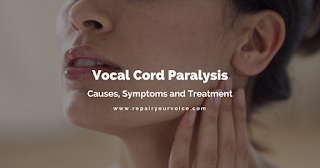What are the causes and available treatment methods for vocal paralysis?
Vocal fold paresis (or vocal cord paralysis) is the result of abnormal nerve input to the muscles within the voice box. When it comes to the human body, the term “Paralysis” means a complete interruption of nerve impulses that cause minimal to no movement for any given body part. In the case of the disruption of the human voice, vocal cord paralysis is the result of nerve-to-muscle interruption within the muscles of the voice box, causing the vocal cords to malfunction, or to not function at all.
Paresis can happen to anyone and in any age from different causes. The effect on patients that suffer from this problem will depend on their lifestyles. A mild form of vocal paresis can greatly effect the career of a speaker or singer.
What nerves are involved?
Vocal fold movements are a result of the coordinated construction of various muscles that are controlled by the brain through a specific set of nerves. The superior laryngeal nerve carries signals to the cricothyroid muscle. Since this muscle adjusts the tension of the vocal folds for high notes especially during singing.
What are the causes?
The cause of vocal fold paralysis can indicate whether the disorder will resolve over time or whether it may be permanent. Some of the reasons can include:
- Inadvertent injury during surgery: Surgery in the neck or in the chest may inadvertently result in vocal paralysis. The SLN (Superior Laryngeal Nerve) may also be injured during head or neck surgery.
- Blunt neck or chest trauma: Any type of penetrating or hard impact on the chest or neck may injure the RLN (Recurrent Laryngeal Nerve); impact to the neck may injure or affect the nerves of the voice box.
- Viral infections: Inflammation from infections may directly include and hurt the vagus nerves (one of 12 cranial nerves). Illnesses can also affect the nerves to the voice box.
What are the symptoms?
Symptoms of vocal paralysis can range from a multitude of things ( like, for example – Voice changes, breathing problems due to lack of airway control, swallowing difficulties, hoarseness and a breathy voice. These above are just to name a few and some of the symptoms within the above list can potentially be life-altering (and even life-threatening) for the voice disorder sufferer.
What is the treatment available for vocal paralysis?
The two strategies for treatment of vocal paralysis are as follows:
One is an operative form of treatment known as
The other is the more desirable and less invasive approach.
There is an alternative form of voice therapy which is conducted by a professional voice practitioner who specializes in a form of voice restoration, sustainment and enhancement. This form of voice restoration & enhancement is known as ‘Non-Surgical Voice Repair’ and it is conducted by The Royans Institute for Non-Surgical Voice Repair.
With a 34 year track record of success with respect of helping those who suffer from voice/vocal disorders & successfully recovered their voices, our unique method has proven to be a critical component and a viable solution for all voice disorder sufferers (that includes those who suffer from vocal paralysis) that seek an alternative method of treatment that does not involve surgery.
For more information on how we can treat this disorder, contact us today!

